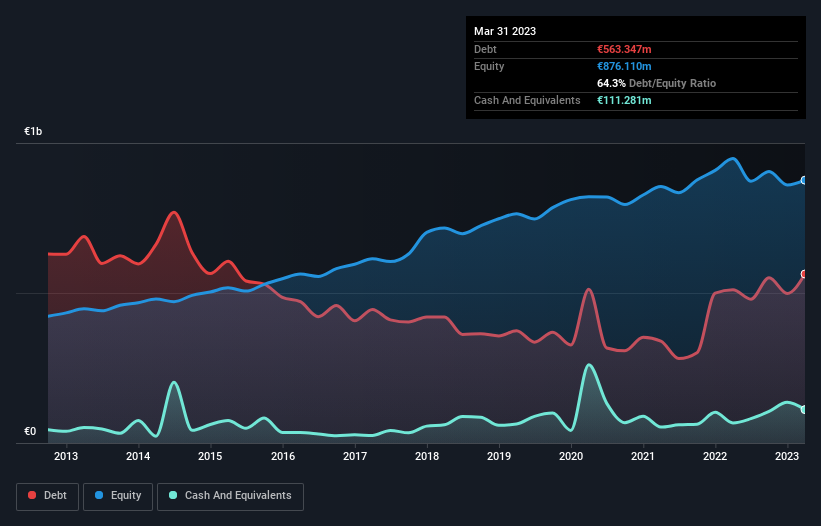Some say volatility, rather than debt, is the best way to think about risk as an investor, but Warren Buffett famously said that 'Volatility is far from synonymous with risk.' When we think about how risky a company is, we always like to look at its use of debt, since debt overload can lead to ruin. We can see that Petrol d.d. (LJSE:PETG) does use debt in its business. But the more important question is: how much risk is that debt creating?
When Is Debt A Problem?
Debt is a tool to help businesses grow, but if a business is incapable of paying off its lenders, then it exists at their mercy. In the worst case scenario, a company can go bankrupt if it cannot pay its creditors. While that is not too common, we often do see indebted companies permanently diluting shareholders because lenders force them to raise capital at a distressed price. Of course, plenty of companies use debt to fund growth, without any negative consequences. When we think about a company's use of debt, we first look at cash and debt together.
View our latest analysis for Petrol d.d
How Much Debt Does Petrol d.d Carry?
You can click the graphic below for the historical numbers, but it shows that as of March 2023 Petrol d.d had €563.3m of debt, an increase on €511.1m, over one year. However, it also had €111.3m in cash, and so its net debt is €452.1m.

A Look At Petrol d.d's Liabilities
The latest balance sheet data shows that Petrol d.d had liabilities of €1.15b due within a year, and liabilities of €642.9m falling due after that. Offsetting this, it had €111.3m in cash and €872.6m in receivables that were due within 12 months. So its liabilities outweigh the sum of its cash and (near-term) receivables by €807.8m.
This deficit is considerable relative to its market capitalization of €1.01b, so it does suggest shareholders should keep an eye on Petrol d.d's use of debt. This suggests shareholders would be heavily diluted if the company needed to shore up its balance sheet in a hurry. When analysing debt levels, the balance sheet is the obvious place to start. But you can't view debt in total isolation; since Petrol d.d will need earnings to service that debt. So if you're keen to discover more about its earnings, it might be worth checking out this graph of its long term earnings trend.
In the last year Petrol d.d wasn't profitable at an EBIT level, but managed to grow its revenue by 56%, to €9.3b. Shareholders probably have their fingers crossed that it can grow its way to profits.
Caveat Emptor
Even though Petrol d.d managed to grow its top line quite deftly, the cold hard truth is that it is losing money on the EBIT line. To be specific the EBIT loss came in at €15m. Considering that alongside the liabilities mentioned above does not give us much confidence that company should be using so much debt. Quite frankly we think the balance sheet is far from match-fit, although it could be improved with time. On the bright side, we note that trailing twelve month EBIT is worse than the free cash flow of €44m and the profit of €325k. So if we focus on those metrics there seems to be a chance the company will manage its debt without much trouble. The balance sheet is clearly the area to focus on when you are analysing debt. But ultimately, every company can contain risks that exist outside of the balance sheet. For example Petrol d.d has 4 warning signs (and 2 which are a bit unpleasant) we think you should know about.
If you're interested in investing in businesses that can grow profits without the burden of debt, then check out this free list of growing businesses that have net cash on the balance sheet.
New: Manage All Your Stock Portfolios in One Place
We've created the ultimate portfolio companion for stock investors, and it's free.
• Connect an unlimited number of Portfolios and see your total in one currency
• Be alerted to new Warning Signs or Risks via email or mobile
• Track the Fair Value of your stocks
Have feedback on this article? Concerned about the content? Get in touch with us directly. Alternatively, email editorial-team (at) simplywallst.com.
This article by Simply Wall St is general in nature. We provide commentary based on historical data and analyst forecasts only using an unbiased methodology and our articles are not intended to be financial advice. It does not constitute a recommendation to buy or sell any stock, and does not take account of your objectives, or your financial situation. We aim to bring you long-term focused analysis driven by fundamental data. Note that our analysis may not factor in the latest price-sensitive company announcements or qualitative material. Simply Wall St has no position in any stocks mentioned.
About LJSE:PETG
Petrol d.d
Through its subsidiaries, sells petroleum and other energy products, merchandise and services, and energy and solutions in Slovenia, Croatia, Austria, Bosnia, Herzegovina, Serbia, Montenegro, Romania, Macedonia, and internationally.
Flawless balance sheet with solid track record and pays a dividend.
Similar Companies
Market Insights
Community Narratives




